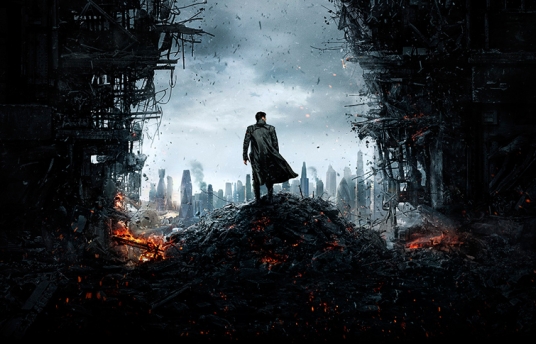Now Playing in Doha! : Star Trek: Into Darkness
May 17, 2013

He Said, He Said: J.J. Abrams’s ‘Star Trek: Into Darkness’
With Shamir Allibhai, DFI’s Head of Digital, and Nicholas Davies, DFI’s Senior English Editor
Nicholas Davies: So. What did we think of that?
Shamir Allibhai: It wasn’t much of a departure far from what was expected… Some big explosions. Some bad dude putting the interplanetary safety of humanity (and non-humanity) at risk. Some trouble with the warp drive.
ND: It’s a Lego movie right? You take the pieces out of the box,dust them off and try to put them together in a an engaging way. So from a distance it looks pretty much the same as the others. If you’re going to dosomething good with it, you need a couple of things. You need a plot that stays inside the bounds of its own logical progression. You need smart writing. You need good perfomances. This film has all that, so it’s enjoyable watching.
SA: Yah except the twist was very predictable.
ND: There was a twist?
SA: Haha. Touché. There was some authentic references to the original ‘Star Trek’, in the characterisations and the whole construction of the universe. I think they call it ‘multi-layered’. You know, bring the Trekkies with you while reaching out to new audiences. It’s calculated, but it works here.
ND: I do think that focusing on the character development is a good idea. It’s what the ‘Second Generation’ schlock movies – which are amazingly, appallingly, shockingly awful – were completely lacking.
SA: There was character development?
ND: HAHA! Touché touché.
SA: It was like, ‘Here is the bad guy’. The End. They should have developed him more, allow us to understand his motivations better. Deeper background info on him. His raison d‘être was lacking. Even simpler things like how did the main antagonist find and meet the couple whose daughter he saved and exchanged in a deal?
ND: I guess I’m thinking Kirk and Spock. They’re trying to explore that relationship, which is one of the the more interesting things about the franchise.
SA: I enjoyed that theme and the humour throughout the film.
ND: It was sharp. All of it was good, and all in character. In a way the whole thing is like watching your friends act out a ‘Star Trek’ episode. Except your friends are really, really rich.
SA: So they should have paid me to watch this, then. The previous Star Trek was much more engrossing, though: the action sequences were vivid; the character motivations were well developed.
ND: I think you’re just saying that because you like wrinkles in the time-space continuum.
SA: Not a fan of wrinkles. Not any of ‘em. Helloooooo botox.
ND: But yes, the destruction of Vulcan was a pretty major event to hang a story on.
SA: And a key driver of motivation for Spock. What was at stake in this film? Secretly developed weapons and ships that could pivot the Federation towards violence?
ND: Cheap things about the plot are its undeveloped dependence on WMD and terrorism without giving any serious thought to what either of those things really mean …
SA: …and the ethics of war and violence. It is a great topic but could have been expounded on much better especially as it is such a timely topic. You had Spock on one side and Kirk who seemed to flip flop on the issue without much reflection and thinking. Should you send a drone missile to kill someone remotely? Due process versus street justice (or space justice)?
ND: I think that question was a little better exposed – remote AND preventive assassination. Even though it’s treated really lightly – it is at least acknowledged as an ethical choice. There has always been that humanist essence to ‘Star Trek’ and the film is true to that. And people still get their heads crushed. Which I always like.
Star Trek: Into Darkness - Trailer
إعلان فيلم "ستار تريك إلى الظلام"